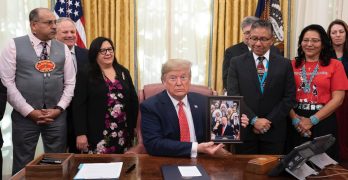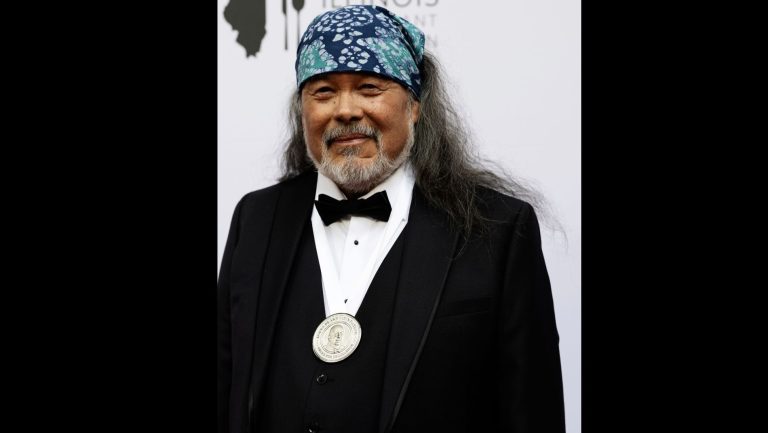Indigenous people of Canada know of the horrors generations of children were forced to endure in residential schools even though records and physical proof are hard to come by. They know from the stories passed down and the traumas they witnessed. “The Knowing” is the newest book from Anishinaabe journalist and best-selling author Tanya Talaga. She takes readers on a journey through scattered residential school records — and their many dead ends — to find Annie, a long lost relative. Her story weaves together her personal quest with Canadian history, providing readers with a better understanding of how racism, greed, misplaced religious intent, and government policy played into Canada’s unforgivable treatment of Indigenous children. But Talaga also celebrates the triumph of healing and the growing momentum to demand justice, acknowledgement, and real reconciliation. “The Knowing” is on our Native Bookshelf.
Coming Up on NATIVE AMERICA CALLING

Monday, July 21, 2025 – Tribes confront the resource-intensive drive to power AI
From finding simple recipes to diagnosing complicated illnesses, artificial intelligence is becoming an increasingly useful part of everyday life. But the space and resources it takes to power that technology is immense and that is hitting close to home for some tribes. The Tonawanda Seneca Nation in New York just filed a lawsuit against a proposed 900-thousand-square-foot AI data center a mile away from their reservation. Chief Kenith Dale Jonathan says the center would harm air quality, water and wildlife. We’ll hear from the tribe and the potential for data center encroachment elsewhere. We’ll also look at how the Trump Administration’s push to use artificial intelligence in medicine would benefit or harm Native Americans.
Past Shows

Thursday, July 17, 2025 – Where Trump finds support among Native Americans
A widely reported exit poll right after the 2024 presidential election greatly exaggerated the support for President Donald Trump by Native Americans. Native voters, by and large, lean Democrat, but it’s clear Native voters supported President Trump more than expected. And since the election, a handful of tribes and Native leaders continue to back the MAGA trend. Louisiana’s Tunica-Biloxi Tribe are among the institutions nominating Trump for a Nobel Peace Prize, citing his foreign policy and domestic economic agenda. We’ll hear from those who think Trump is moving Native interests in the right direction.

Wednesday, July 16, 2025 – Tribes insist on protections for wolves in the face of public pressures
When the state of Idaho bowed out of a grey wolf reintroduction program and even proposed a major reduction in wolf populations, the Nez Perce tribe stepped in to help the endangered animal’s fate. With a deep spiritual and cultural connection to wolves, the tribe sought to improve wolf numbers over the objections of many decision makers and members of the public. Now the state is pushing a plan to cut wolf numbers by more than half. Tribes in Wisconsin are also weighing in on proposals to end certain protections for wolves in that state. In Idaho, the tribes say the animals have cultural significance. We’ll hear about tribal efforts to help wolves, and get a picture of a film about the Cherokee connections to the red wolf.

Tuesday, July 15, 2025 – Native romance writers move beyond the ‘bodice ripper’ stereotype
The main character in Chickasaw writer Danica Nava’s debut novel gets into trouble for making some questionable claims about her Chickasaw identity to try and get ahead in the working world. Cherokee citizen Christina Berry writes about an Austin woman’s sometimes funny, sometimes heart wrenching desire to start a family. And Karen Kay’s historical novel explores an interracial connection on the mid-1800s Great Plains frontier. What each of these books has in common is the quest for true love. They also have honest, complex, and engaging portrayals of Native characters written by Native authors. We’ll hear from them about their work and Native representation in modern romance literature.

Monday, July 14, 2025 – What the Texas flash floods teach us about emergency preparedness
For nearly a decade, state and local officials disacussed how to avoid fatalities, injuries, and property damage in the Guadalupe River valley in Texas. They failed to secure funds for a public warning siren. The flood killed more than 120 people and at least 160 are missing. Earlier this year, after numerous warnings by inspectors, a levee in Oregon gave way, damaging more than 950 homes, including those of the Burns Paiute Tribe. And on the Navajo Nation, notification was key to helping hundreds of residents evacuate as the Oak Ridge fire consumed more than 11,000 acres. We’ll hear about those and emergency plans by some other tribes aimed at keeping threats from becoming human tragedies.

Friday, July 11, 2025 – What we’ve learned in the 35 years since the Mohawk Resistance at Oka
The 78-day armed standoff just outside of Montreal in 1990 is credited with clearing a path for reconciliation between Indigenous tribes and the Canadian federal government. The country can count a number of initiatives, government resolutions, and task forces that sprouted from the violence 35 years ago. But many of Indigenous people connected to the direct action say any progress since then is slow and insufficient. We’ll recount the conflict sparked by a town’s plan to build a golf course and condominiums on sacred Mohawk land and assess the state of awareness for Indigenous issues since then.
Also, what is the most effective response when public figures make comments that go well past acceptable boundaries? How are they held accountable? We’ll reflect on a social media post by conservative commentator Ann Coulter that prompted rebuke by hundreds of Native American leaders and individuals.

Thursday, July 10, 2025 – Tulsa takes new tack on tribal jurisdiction
The Muscogee Nation will assume some law enforcement duties in the city of Tulsa, Okla., when it comes to tribal citizens. The development over jurisdiction ends a federal lawsuit filed by the Muscogee Nation in the wake of the U.S. Supreme Court’s landmark McGirt decision in 2020. The Cherokee and Osage Nations also potentially have jurisdiction claims in Tulsa and other cities. Local law enforcement officials and Gov. Kevin Stitt (R-OK) oppose the agreement, saying it creates a two-tiered system of justice. We’ll find out what the new agreement solves and what it leaves unanswered.
Also, tribes connected to Florida are speaking out against the Trump administration’s fast track plans to establish a detention center for immigration actions near the Florida Everglades. Miccosukee and Seminole tribal officials and citizens say the center, dubbed the “Alligator Alcatraz,” infringes on land that is their “cultural, spiritual, and historical identity.”

Wednesday, July 9, 2025 – Tribes forced to find new clean energy paths
President Donald Trump’s earlier executive orders and the comprehensive spending bill he just signed mark the end of dozens of tribal green energy initiatives. They mark a major shift in direction away from solar, wind, and other renewable energy sources championed during the Biden administration. Those projects aimed at energy sovereignty that can’t find new, private-sector funds will halt or scale back their original scope.
And, an Alaska tribal village is hoping a transition away from oil-fueled energy will both save money and help the environment.

Tuesday, July 8, 2025 – Residents brace for Medicaid and food assistance cuts
The Congressional Budget Office estimates the spending bill just signed by President Donald Trump will increase the number of people without health insurance by 16 million over the next ten years. The $1.1 trillion cuts to Medicaid will also affect Native Americans who rely on it to pay for health care through the Indian Health Service and threatens rural hospitals with a high rate of Medicaid-dependent patients. The new spending plan also substantially reduces the number of people who will collect food assistance through the federal government. We’ll get insights on what these numbers mean for Native Americans who disproportionately rely on these two federal government programs.
We’ll also find out about the significance of the new Indigenous head of Mexico’s Supreme Court.

Monday, July 7, 2025 – Two authors offer a kids-eye view of the importance of relatives
“Fierce Aunties” by author Laurel Goodluck (Mandan, Hidatsa, Tsimshian) is a colorful, enthusiastic celebration of the Indigenous women we need in our lives. Goodluck’s children’s book explores the many ways women provide support for the young people who look up to them. Another writer, Virginia Driving Hawk Sneve (Sicangu and Ponca), also explores the power of relatives in her young readers chapter book, “The Summer of the Bone Horses.” The book is also an homage to her late brother by telling an interesting piece of his story on the Rosebud Sioux Reservation in the late 1940s. Among the awards won by the long-time children’s book author and educator is the National Humanities Medal. Both books are illustrated by the talented artist Steph Littlebird (Confederated Tribes of Grand Ronde). We’ll hear from all three women about their work.






